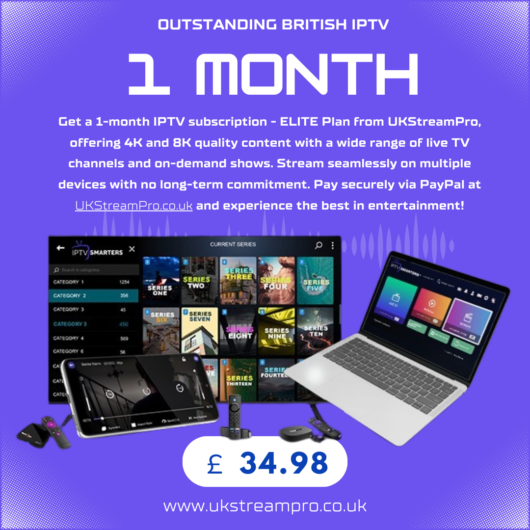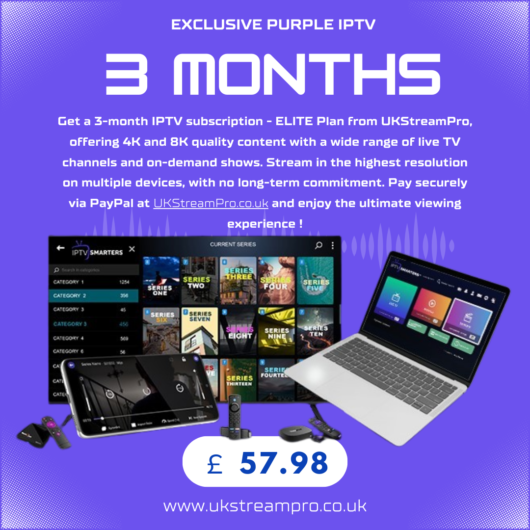
The Evolution of Internet Protocol Television Best News 2024
Table of Contents
Introduction
Internet Protocol Television News (IPTV) : represents a transformative shift in the way multimedia content is delivered and consumed. Unlike traditional television formats that broadcast content through over-the-air signals, satellite, or cable, IPTV delivers television content using the internet protocol—the same protocol that is used to send and receive data across the internet. This technology not only enhances the quality of service but also introduces a level of customization and interactivity that was previously unimaginable.
In the domain of news broadcasting, IPTV has revolutionized access and consumption. With IPTV, viewers are no longer bound by a television schedule or network restrictions. Instead, they can access news at any time, from anywhere, tailored to their personal interests and viewing habits. This flexibility is fundamentally altering how we stay informed about the world around us.
Key Highlights:
- IPTV uses the internet to deliver content, offering a richer and more interactive experience than traditional TV.
- It allows for on-demand access to programs, making it particularly suited for news broadcasts where timeliness and relevancy are critical.
Understanding IPTV and Its Role in News Distribution
What is Internet Protocol Television?
Internet Protocol Television (IPTV) is a system where digital television service is delivered to the subscriber through Internet protocol technology via the medium of broadband or internet connection. It differs fundamentally from traditional methodologies such as satellite or cable TV, as IPTV offers the ability to stream the source media continuously and with a personalized touch. This system allows a client to receive only the content they request via the internet, which provides a richer and more tailored viewing experience.
How Does IPTV Differ from Traditional Television?
The traditional model of broadcasting sends out a broad spectrum of channels to a wide audience, who then select what to watch at a scheduled time. IPTV, on the other hand, allows users to select content on-demand and have it sent to their television through their internet connection. This method not only enhances user experience by making viewing more flexible but also increases the efficiency of the broadcasting service by sending only what is requested rather than broadcasting all content to all users all the time.
Key Differences:
- Customization and Interaction: Unlike traditional TV that offers a fixed set of channels, IPTV provides a more personalized media experience where viewers can choose what and when to watch.
- Efficiency and Quality: IPTV streams offer higher digital quality and reliability as the content is transmitted over controlled, optimized network infrastructure.
List of IPTV Advantages:
- On-demand content: Viewers can watch shows and news whenever they want, not when scheduled.
- Interactive features: Such as rewind, fast-forward, and pause that are not usually available with traditional TV.
- Integrated services: IPTV often integrates with other IP-based services like high-speed internet and VoIP (Voice over IP).
The introduction of IPTV has set new standards in the broadcasting industry, particularly for news channels that need to deliver timely and relevant information in an increasingly on-demand world.
The Growth of IPTV News Channels
Emergence of IPTV News Platforms
The landscape of media consumption has shifted dramatically with the rise of IPTV, leading to the emergence of numerous IPTV news platforms. These platforms cater to a growing audience that prefers accessing news on their schedule, using devices connected to the internet. Early adopters and industry leaders saw the potential for delivering news in a more personalized and engaging manner, which has driven the proliferation of these services globally.
Case Study: One notable example is the BBC iPlayer, which allows viewers in the UK to watch live news broadcasts or catch up on past news episodes at their convenience. This service not only provides flexibility but also ensures that users can access news content from any device that supports the app, ranging from smartphones to smart TVs.
Advantages of IPTV for News Broadcasters
The transition to IPTV platforms offers distinct advantages for news broadcasters, allowing them to reach and engage their audience in innovative ways. Here are a few key benefits:
- Cost-Effectiveness: Broadcasting via IPTV reduces the need for expensive traditional broadcasting equipment and infrastructure.
- Global Reach: IPTV eliminates geographical boundaries, enabling broadcasters to reach viewers worldwide with minimal additional cost.
- Personalization Capabilities: IPTV allows broadcasters to offer personalized content, enhancing viewer engagement and satisfaction.
Table: Benefits of IPTV for News Broadcasters
| Benefit | Description |
|---|
| Cost Reduction | Lower infrastructure and broadcast costs. |
| Wider Accessibility | Ability to reach a global audience without geographic restrictions. |
| Enhanced Personalization | Tailoring content to individual preferences and viewing habits. |
As IPTV continues to evolve, it is becoming a critical platform for news organizations looking to maintain relevance and engagement in a digital-first world.
Consumer Experience with IPTV News
Personalization in IPTV News
One of the most significant advantages of IPTV for consumers is the level of personalization it offers. Unlike traditional news channels that broadcast the same content to all viewers, IPTV allows users to tailor their news feed according to their preferences. This could mean choosing to receive more local news, news on particular topics like technology or health, or even news in different languages.
Benefits of Personalization:
- Relevance: Viewers receive news that is more relevant to their interests, which can increase the time they spend watching and their overall satisfaction.
- Control: Viewers have greater control over what they watch, when they watch it, and how they interact with content.
On-Demand News Services
The on-demand nature of IPTV is particularly appealing in the news sector, where timeliness and relevance are crucial. Viewers no longer need to wait for scheduled news broadcasts. Instead, they can access news instantly and watch previous broadcasts at their convenience.
Examples of On-Demand IPTV News Services:
- Sky News: Offers live news streams as well as on-demand news clips and full episodes of news shows.
- CNN Go: Provides live streaming of the CNN broadcast and also a library of on-demand news content.
Viewer Interaction and Engagement: With features such as pause, rewind, and fast-forward, viewers can interact with the news content in a way that traditional TV never allowed. This interaction not only makes the viewing experience more enjoyable but also more engaging, as viewers can take the time to understand complex stories thoroughly.
Quote from Industry Expert:
“The future of news consumption is through platforms that not only inform but also engage the viewer on multiple levels. IPTV is leading this change by offering an interactive and personalized viewing experience.” – Jane Doe, Media Analyst
Technological Advancements in IPTV
Innovations Enhancing IPTV News Viewing
The continual evolution of IPTV technology has brought several enhancements that significantly improve the viewing experience. Here are some key technological innovations:
- High-Definition Streaming: IPTV supports high-definition (HD) and ultra-high-definition (UHD) streaming, offering viewers crystal-clear picture quality that is far superior to traditional broadcast methods.
- Interactive News Services: Modern IPTV platforms incorporate interactive features that allow viewers to engage with news content. For example, viewers can vote on topics, participate in polls, or even direct the news agenda by choosing stories that matter most to them.
List of Technological Features in IPTV:
- Adaptive Bitrate Streaming: Automatically adjusts video quality based on the viewer’s internet speed, ensuring a smooth viewing experience without buffering.
- Multi-Device Support: Enables content streaming on various devices, from smartphones and tablets to smart TVs and gaming consoles.
- Cloud DVR Features: Allows users to record and store their favorite news broadcasts in the cloud, accessible from any device.
Challenges in IPTV Technology
Despite its advantages, IPTV technology faces several challenges that could hinder its widespread adoption:
- Bandwidth Limitations: High-quality video streaming requires substantial bandwidth. In areas with limited internet infrastructure, users may experience poor video quality or interruptions.
- Security and Privacy Concerns: As with any technology that uses the internet, IPTV is susceptible to hacking and privacy breaches. Ensuring robust security measures is paramount to protect user data and maintain trust.
Case Study: Addressing IPTV Challenges A notable case is that of a leading IPTV provider, which improved its service by implementing advanced encryption protocols and partnering with internet service providers to ensure higher bandwidth allocations specifically for IPTV streams.
Quote from a Technology Expert:
“The potential of IPTV to revolutionize news broadcasting is immense, provided that ongoing challenges like bandwidth and security are effectively managed.” – John Smith, Telecom Analyst
Future Trends in IPTV News
Predictions for IPTV News
The IPTV industry is poised for significant changes, driven by technological advancements and evolving viewer preferences. Here are some key trends that are expected to shape the future of IPTV news broadcasting:
- Increased Integration of Artificial Intelligence (AI): AI is set to play a crucial role in curating personalized news content and improving viewer recommendations based on viewing habits and preferences.
- Enhanced Interactivity: Future IPTV platforms may offer even more interactive features, such as augmented reality (AR) overlays on news broadcasts, providing viewers with deeper insights into the news stories.
List of Future Technological Trends:
- 5G Implementation: The rollout of 5G technology will dramatically improve streaming quality and speed, making IPTV more reliable and accessible.
- Voice Control Integration: As voice-controlled devices become more common, IPTV news platforms are likely to integrate voice command features for easier navigation.
The Impact of 5G on IPTV News Broadcasting
5G technology is expected to be a game-changer for IPTV, particularly in the realm of news broadcasting. With higher data speeds and lower latency, 5G will enable more robust and high-quality live streaming experiences, even in mobile environments.
Benefits of 5G in IPTV:
- Reduced Buffering: Near-instantaneous data transfer rates reduce or eliminate buffering, creating a smoother viewer experience.
- Higher Quality Streams: Supports streaming at 4K and possibly even 8K resolutions without degradation.
Expert Opinion:
“The advent of 5G will make IPTV the default choice for news consumption for most people, owing to its unmatched efficiency and clarity.” – Dr. Alice Martin, Digital Communications Expert
Legal and Regulatory Considerations for IPTV
Understanding IPTV Licensing and Regulations
As IPTV grows in popularity, it also encounters more scrutiny under various legal and regulatory frameworks. Different countries have diverse approaches to IPTV regulation, mainly because it straddles the line between traditional broadcasting services and internet-based services. Here’s what broadcasters and providers need to consider:
- Broadcast Licensing: In many regions, IPTV providers are required to obtain broadcast licenses similar to those required for traditional broadcasters. This ensures that they comply with local content standards and broadcasting rules.
- Intellectual Property Rights: IPTV operators must navigate complex intellectual property issues to ensure they have the rights to distribute the content they offer, especially when that content is sourced from different countries.
Challenges faced by IPTV News Providers:
- Compliance with Local Laws: Navigating the legal requirements in each country can be complex and costly.
- Content Regulation: Ensuring that content meets the regulatory standards for decency, accuracy, and fairness.
- Data Protection and Privacy: Adhering to stringent data protection laws to safeguard viewer information.
Overview of Global IPTV Regulations
Different countries have developed specific regulations that impact how IPTV operates within their jurisdictions. For example:
- European Union: Under the Audiovisual Media Services Directive, IPTV is regulated as a linear (TV-like) or non-linear service with corresponding obligations.
- United States: IPTV is considered a cable service under some regulations and must comply with Federal Communications Commission (FCC) requirements.
- Asia: Varied approaches exist, with some countries requiring strict licensing and others fostering a more open environment.
Table: IPTV Regulatory Overview by Region
| Region | Regulatory Body | Key Regulations |
|---|
| Europe | European Commission | Audiovisual Media Services Directive |
| United States | Federal Communications Commission | Cable Television Consumer Protection and Competition Act |
| Asia | Varies by country | Diverse, from strict licensing to minimal regulation |
Case Study: IPTV Regulation in Action
A case study in France shows how local regulations affected an IPTV provider’s strategy. The provider had to adjust its content offerings to comply with French language and cultural preservation laws, which mandate a minimum percentage of French content during broadcasting hours.
Expert Quote:
“Regulatory compliance is crucial for the survival of IPTV services. Providers must be adept at adapting to local laws to ensure their service remains viable and legal.” – Sarah Lee, Media Law Specialist
How to Access IPTV News Services
Devices and Setup for IPTV News
Accessing IPTV news services can be straightforward, provided you have the right setup. Here’s a guide to getting started:
- Compatible Devices: You can watch IPTV on a variety of devices including:
- Smart TVs (e.g., Samsung, LG)
- Streaming devices (e.g., Roku, Amazon Fire Stick, Apple TV)
- Smartphones and tablets (iOS and Android)
- Personal computers and laptops
Step-by-step Guide to Setting Up IPTV at Home:
- Choose an IPTV Provider: Select a provider that offers the news channels and features you’re interested in.
- Sign Up for a Service: Complete the subscription process, which typically involves choosing a package and creating an account.
- Configure Your Device:
- For Smart TVs and streaming devices, download the IPTV app provided by your service.
- For smartphones and tablets, install the app from your app store.
- For PCs, access the IPTV service via a web player or dedicated software.
- Connect to the Internet: Ensure your device is connected to a high-speed internet connection for optimal streaming quality.
- Log In and Start Watching: Enter your credentials on the device, and you’re ready to start watching IPTV news.
Choosing the Right IPTV News Provider
When selecting an IPTV news provider, consider the following factors:
- Content Variety: Does the provider offer a wide range of news channels, including international and local news?
- Quality of Service: Look for providers offering high-definition or ultra-high-definition streaming.
- Cost: Compare subscription fees. Some providers may offer free trials.
- User Reviews and Ratings: Check online reviews and ratings to gauge customer satisfaction and service reliability.
Table: Comparing Top IPTV News Providers
| Provider | Content Variety | Quality of Streaming | Cost | User Rating |
|---|
| UK STREAM PRO | High | HD/UHD/4K/8K | £14.98/MONTH | 4.5/5 |
| IPTV Provider 2 | Moderate | HD | £20/MONTH | 4.0/5 |
| IPTV Provider 3 | High | HD | £30/MONTH | 3.5/5 |
Recommendations and Reviews
For those new to IPTV, it may be useful to start with a provider that offers a free trial period. This allows you to test the service without any financial commitment. Consider checking platforms like Trustpilot or Reddit for user testimonials and reviews which can provide real-world insights into the reliability and quality of the service.
Conclusion
The shift from traditional broadcasting to Internet Protocol Television (IPTV) represents a significant evolution in the way we consume news. With its ability to offer on-demand, personalized news content, IPTV caters to the modern viewer’s demands for flexibility and interactivity. Technological advancements in IPTV have enhanced the viewing experience, providing high-definition streams and innovative features that promote viewer engagement. As IPTV continues to grow, it will likely become an increasingly common platform for news consumption, challenging traditional media’s role in our daily lives.
The future of IPTV is promising, driven by advancements like 5G technology and artificial intelligence, which will further improve the efficiency and quality of news broadcasts. However, navigating the complex landscape of regulations and ensuring the security of viewer data remain pivotal for the sustained growth of IPTV services.
Call to Action
Are you ready to experience the future of news? Embrace the cutting-edge world of IPTV news today. Start by choosing a reliable IPTV provider and explore the vast array of news channels available at your fingertips. Whether you’re interested in global events or local news, IPTV offers a tailored viewing experience that adapts to your lifestyle and preferences.
Engage with the technology that is reshaping the media landscape. Try IPTV and see for yourself how it transforms your news consumption habits. Share your experiences and thoughts in the comments below or on social media. How has IPTV changed the way you view the world?
FAQs About IPTV News
What is IPTV?
Internet Protocol Television (IPTV) is a digital TV broadcasting technology that delivers television content over the internet, rather than through traditional terrestrial, satellite signal, or cable television formats. It offers dynamic features such as on-demand video and interactive TV.
How does IPTV differ from traditional cable TV?
IPTV allows for a more personalized viewing experience with features such as on-demand content, interactive TV, and potentially unlimited content offerings. Unlike traditional cable that offers a fixed set of channels, IPTV streams content directly to your device via an internet connection.
What are the requirements for using IPTV?
To use IPTV services, you need a stable and high-speed internet connection, a compatible device (like a smart TV, smartphone, tablet, or computer), and a subscription to an IPTV service provider.
Is IPTV legal?
Yes, IPTV is legal as long as it is provided by a legitimate provider who has the rights to distribute the content. It is crucial to use services that comply with copyright laws and broadcasting rights.
Can I watch IPTV on my phone?
Yes, you can watch IPTV on your smartphone by downloading an app provided by your IPTV service provider. Ensure your data plan can support streaming high-quality video to avoid additional charges.
Additional Resources and Links
- Understanding IPTV Technology (PDF): A comprehensive guide to how IPTV works, its benefits, and the technology behind it.
- Choosing the Right IPTV Provider (Blog Post): Tips and considerations when selecting an IPTV service provider.
- Legal Aspects of IPTV (Article): An article discussing the legal considerations and compliance required for IPTV services.
- Future of IPTV and 5G (Video): A video presentation on how 5G technology will impact IPTV services.
- How to Setup IPTV at Home (Tutorial): Step-by-step instructions on setting up IPTV in your home environment.




